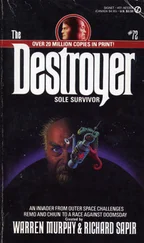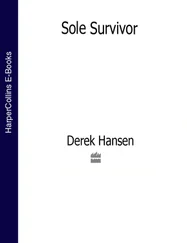Mercy stood in the open kitchen door. ‘Maybe half a mile as the crow flies. Maybe a little farther.’
Out of the torn meadow, into the forest where the fire died quickly because it had been a wet summer that year, farther into the darkness of the trees, thrashing through the thin underbrush, eyes adjusting grudgingly to the gloom, perhaps onto a deer trail that allowed easy passage, perhaps across another meadow, to the hilltop from which the ranch lights could be seen, Rose might have led — or mostly carried — the child. Half a mile as the crow flies, but twice or three times as far when one followed the contours of the land and the way of the deer.
‘One and a half miles on foot,’ Joe said.
‘Impossible,’ Barbara said.
‘Very possible. She could have done it.’
‘I’m not talking about the hike.’ She turned to Mercy and said, ‘Mrs. Ealing, you have been an enormous help to us already, a really enormous help, but we’ve got a confidential matter to discuss here for a minute or two.’
‘Oh, of course, I understand. You just take all the time you want,’ said Mercy, hugely curious but still too polite to intrude. She backed off the threshold and closed the kitchen door.
‘Only a mile and a half,’ Joe repeated.
‘On the horizontal,’ Barbara said, moving close to him, putting a hand on his shoulder. ‘Only a mile and a half on the horizontal, but more than four miles on the vertical, straight down, sky to ground. That’s the part I can’t accept, Joe.’
He was struggling with it himself. To believe in survivors required faith or something very like it, and he was without faith by choice and by necessity. To put faith in a god would require him to see meaning in the suffering that was the weft of human experience, and he could see no meaning to it. On the other hand, to believe that this miracle of survival resulted somehow from the scientific research in which Rose was engaged, to contemplate that humankind could reach successfully for godlike power — Shadrach saving Shadrach from the furnace, Lazarus raising Lazarus from the grave — required him to have faith in the transcendent spirit of humankind. Its goodness. Its beneficent genius. After fourteen years as a crime reporter, he knew men too well to bend his knee before the altar in the First Church of Humanity the Divine. Men had a genius for arranging their damnation, but few if any were capable of their own salvation.
With her hand still on Joe’s shoulder, being tough with him but in the spirit of sisterly counselling, she said, ‘First you want me to believe there was one survivor of that holocaust. Now it’s two. I stood in the smoking ruins, in the slaughterhouse, and I know that the odds against anyone walking out of there on her own two feet are billions to one.’
‘Granted.’
‘No — greater than billions to one. Astronomical, immeasurable.’
‘All right.’
‘So there simply are no odds whatsoever that two could have come through it, none, not even an infinitesimal chance.’
He said, ‘There’s a lot I haven’t told you, and most of it I’m not going to tell you now, because you’re probably safer not knowing. But one thing. this Rose Tucker is a scientist who’s been working on something big for years, government or military financing behind it, something secret and very damn big.’
‘What?’
‘I don’t know. But before she boarded the flight in New York, she called a reporter out in Los Angeles, an old friend of hers, and set up an interview, with trusted witnesses, at the arrival gate at LAX. She said she was bringing something with her that would change the world forever.’
Barbara searched his eyes, obviously seeking some sign that he was not serious about this change-the-world-overnight fantasy. She was a woman of logic and reason, impressed by facts and details, and experience had shown her that solutions were found at an inchworm’s pace, in a journey of countless small steps. As an investigator, for years she’d dealt with puzzles that presented her with literally millions of pieces and that were hugely more complex than virtually any homicide case to which any police detective was ever assigned, mysteries of human action and machine failure that were solved not with miracles but with drudgery.
Joe understood the look in her eyes, because investigative journalism was not unlike her own work.
‘Just what are you saying?’ she pressed. ‘That when the plane rolls and plummets, Rose Tucker takes a squeeze bottle out of her purse, some fabulous new topical lotion that confers temporary invulnerability on the user, sort of like a sunscreen, and quickly coats herself?’
Joe almost laughed. This was the first time he’d felt like laughing in ages. ‘No, of course not.’
‘Then what?’
‘I don’t know. Something.’
‘Sounds like a big nothing.’
‘Something,’ he insisted.
With the forge fire of lightning now gone and with the crack of thunder silenced, the churning clouds had an iron-dark beauty.
In the distance the low wooded hills were veiled in mists of enigma — the hills across which she had come that night, untouched out of fire and destruction.
Skirling wind made cottonwoods and aspens dance, and across the fields, billows of rain whirled like skirts in a tarantella.
He had hope again. It felt good. Exhilarating. Of course that was why hope was dangerous. The glorious lifting up, the sweet sense of soaring, always too brief, and then the terrible fall that was more devastating because of the sublime heights from which it began.
But maybe it was worse never to hope at all.
He was filled with wonder and quickening expectation.
He was scared too.
‘Something,’ he insisted.
He took his hands off the railing. His legs were sturdy again. He blotted his wet hands on his jeans. He wiped his rain-spattered face on the sleeve of his sportscoat.
Turning to Barbara, he said, ‘Somehow safe to the meadow, then a mile and a half to the ranch. A mile and a half in an hour and fifteen minutes, which might be just about right in the darkness, with a small child to carry or help along.’
‘I hate to be always the pin in the balloon—’
‘Then don’t be.’
‘—but there’s one thing you have to consider.’
‘I’m listening.’
Barbara hesitated. Then: ‘Just for the sake of argument, let’s accept that there were survivors. That this woman was on the plane. Her name is Rose Tucker. but she told Mercy and Jeff that she was Rachel Thomas.’
‘So?’
‘If she doesn’t give them her real name, why does she give them Nina’s real name?’
‘These people who’re after Rose. they’re not after Nina, they don’t care about Nina.’
‘If they find out Rose somehow saved the girl, and if she saved the girl because of this strange, radical news-truth-thing-whatever that she was bringing with her to the press interview in Los Angeles, then maybe somehow that makes the girl as big a danger to them as Rose herself seems to be.’
‘Maybe. I don’t know. I don’t care right now.’
‘My point is — she’d use another name for Nina.’
‘Not necessarily.’
‘She would,’ Barbara insisted.
‘So what’s the difference?’
‘So maybe Nina is a false name.’
He felt slapped. He didn’t reply.
‘Maybe the child who came to this house that night is really named Sarah or Mary or Jennifer
‘No,’ Joe said firmly.
‘Just like Rachel Thomas is a false name.’
‘If the child wasn’t Nina, what an amazing coincidence it would be for Rose to pluck my daughter’s name out of thin air. Talk about billion-to-one odds!’
Читать дальше












